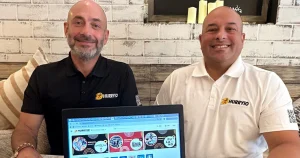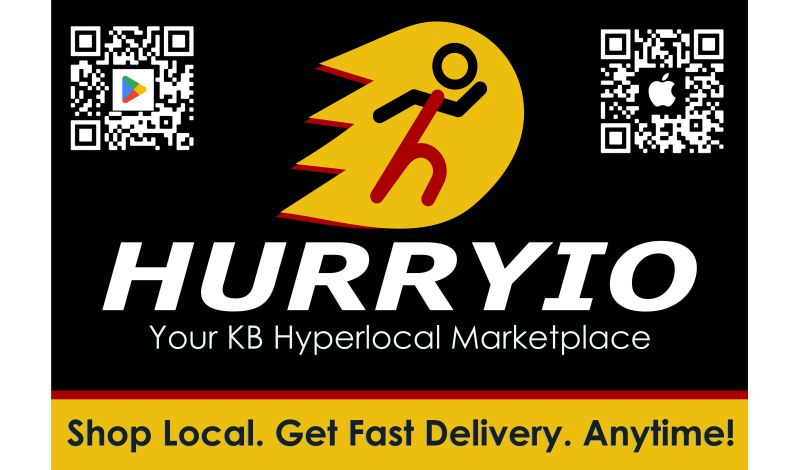After years of running a successful 7-Eleven in Key Biscayne, Manny Paez had an epiphany: delivery. But not just for orders from his store. From restaurants and retailers throughout the island. It was a big idea and one he couldn’t shake, although he knew it wouldn’t be easy. “I just decided to jump in and do it,” he said in an interview.

Jose Ortiz and Manny Paez, co-founders of Hurryio
He hired a couple software consultants to engineer the tech and his daughter helped him with the name and the whole thing took a couple years. He launched Hurryio on July 1.
Next comes enrolling restaurants on the island. He’s courting them the old-fashioned way. He’s going door to door up and down the four-mile island. His pitch is easy-to-grasp: the dominant third-party delivery providers charge you 30 percent of every order; I’ll charge you half that. So far, 45 merchants have said yes.
“The restaurants prefer to work with us because we’re cheaper and we’re managing each order in person. We’re not just relying on machines to do it,” he said.
He has a similarly attractive pitch to drivers. While the traditional delivery providers may keep a portion of the fees, Hurryio charges a flat $5 fee and the drivers keep all of it, plus tips. He’s convinced 20 drivers to join the platform.
When asked to define what sets Hurryio apart in the delivery marketplace, Paez doesn’t hesitate. “Hyper-localization,” he said. “The other delivery providers don’t offer a hyper-local service. It’s not a personal business to them. It is to us. We know these restaurants. We know our drivers. We’re friends with them.”
There are about 5,500 families on the Island, many of them with Latin American roots, and you get a sense Paez knows them all. That’s an advantage.
But he also has a disadvantage. “There really isn’t a delivery culture on the island,” he said. “A lot of the folks who run businesses here don’t use it. Not yet.”
What gives him hope, and what has served as a form of market research, is when he learned about the delivery-company Rappi and how well it is doing in Latin America. “I talked to people about Rappi’s success, which opened my eyes,” he said. “It gave me confidence that this could work here.”
But he has ground to cover. Unlike the big third-party delivery providers who have their tech in place to integrate seamlessly with an operator’s POS system, Hurryio requires an operator to punch in orders. Paez hears the grumbles about this.
“We’re finding some restaurants don’t want to bother with having to input the order and have a separate accounting for that, which is what they have to do with mine right now,” he said. “But we’re slowly adding different integrations for POS systems, like Square and Toast.”
The Next Stage
Although he’s still only in the third month of building out Hurryio, and still tending to his 7-Eleven, he’s already got another business ready to launch.
“Next month we’re opening a ghost kitchen,” he said. “We’re working on three units. One will be a Lebanese restaurant. That’s already in place. We’re going to have boxed lunches prepared to order. We’ll have a menu for each day and we’re going to have a sales guy knocking on office doors and selling the lunches. That will run through Hurryio. And we are going to have coffee/bakery concept. That was one of our learnings when we studied what Rappi is doing in Latin America. It has a lot of ghost kitchens and that’s how it is able to make deliveries in under 10 minutes.”
He’s also planning to take over a struggling local restaurant and try to revive it, with other partners and a separate business unit.
When it is politely suggested to Paez that he might be stretched a bit thin, he gives the time-honored, weary affirmation of every entrepreneur. “You’re not wrong,” he said with a laugh. But he’s also not slowing down.
“Our goal is to become a Key Biscayne delivery marketplace, for both food and other retail items,” he said. “To become profitable we have to keep expanding. So that’s what we’re going to do. It’s time to make some money.”


